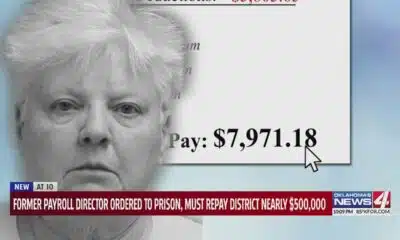News from the South - Arkansas News Feed
US Senate mega-bill drops requirement states help pay for SNAP program
by Jennifer Shutt, Arkansas Advocate
June 23, 2025
WASHINGTON — U.S. Senate Democrats have succeeded in eliminating more than a dozen policy changes from Republicans’ “big, beautiful bill” after successfully arguing before the chamber’s parliamentarian that the elements didn’t comply with the strict rules that go along with writing a budget reconciliation bill.
Removed is language that would have transferred some of the cost of running the Supplemental Nutrition Assistance Program to state governments, potentially leaving states on the hook for billions in added spending on the food aid program for lower-income people.
Democrats also fended off a proposal to eliminate funding for the Consumer Financial Protection Bureau, which fields complaints on banking and other financial institutions, and another that sought to bar federal district court judges from issuing nationwide injunctions.
Among the contested items that remained, Missouri Republican Sen. Josh Hawley announced in a social media post that his years-long effort to reauthorize the Radiation Exposure Compensation Fund, or RECA, passed what’s known on Capitol Hill as the “Byrd bath” test.
“Terrific news for Missouri, radiation survivors, and MAHA: RECA has passed the ‘Byrd bath’ – Democrats did not strip it – and will be in the final bill,” Hawley wrote, referring to the Trump administration’s Make America Healthy Again slogan. “Huge step forward #MAHA.”
Democrats to continue challenges
Budget Committee ranking member Jeff Merkley, D-Ore., has cheered many of the parliamentarian’s rulings, though Republican committee chairs say they’ll look for ways to rewrite the various proposals.
“Today, we were advised by the Senate Parliamentarian that several more provisions in this Big Beautiful Betrayal of a bill will be subject to the Byrd Rule — and Democrats plan to challenge every part of this bill that hurts working families and violates this process,” Merkley wrote in a statement released Saturday night. “Republicans’ relentless attack on middle class families in order to fund tax breaks for billionaires is a slap in the face to working families everywhere, and Democrats are fighting back.”
The changes could create several issues for Senate Majority Leader John Thune, R-S.D., and eventually for Speaker Mike Johnson, R-La., who need nearly every GOP lawmaker in Congress to vote for the sweeping tax and spending cuts package in order for it to become law.
The House voted 215-214 to approve its version of the bill in May, but since the Senate is making substantial changes, the House will have to vote on the measure again before it can go to President Donald Trump for his signature. GOP leaders hope to complete all that before the Fourth of July.
Republicans are using reconciliation, instead of moving the bill through the regular legislative process, to avoid needing Democratic votes to get past the Senate’s 60-vote legislative filibuster.
But the lower threshold for passing a reconciliation bill comes with several requirements, including that all of the proposals in the package have an impact on spending or revenues that’s not “merely incidental.”
The Senate parliamentarian, the chamber’s official scorekeeper who holds a detailed understanding of the rules and procedures, examines each of those policies and hears from both Republicans and Democrats before issuing the rulings.
The Byrd bath began last week behind closed doors and will continue for at least several more days. Once it concludes, Senate GOP leaders can move the bill to the floor, where members of both parties can call for votes on as many amendments as they want.
SNAP program
Agriculture, Nutrition and Forestry Committee Chairman John Boozman, R-Ark., released a written statement defending his committee’s bill after the parliamentarian ruled several provisions must go to comply with the rules.
“To rein in federal spending and protect taxpayer dollars the committee is pursuing meaningful reforms to the Supplemental Nutrition Assistance Program (SNAP) to improve efficiency, accountability and integrity,” Boozman wrote. “We are continuing to examine options that comply with Senate rules to achieve savings through budget reconciliation to ensure SNAP serves those who truly need it while being responsible stewards of taxpayer dollars.”
The parliamentarian ruled the committee erred in including language that would have shifted some of the cost of the SNAP program to state governments if they didn’t meet an efficiency benchmark before 2028.
A proposal to eliminate SNAP eligibility for “immigrants who are not citizens or lawful permanent residents, with certain exceptions,” was also determined not to comply with the rules, according to a press release from Merkley.
Minnesota Democratic Sen. Amy Klobuchar, ranking member on the committee, wrote the parliamentarian’s ruling “made clear that Senate Republicans cannot use their partisan budget to shift major nutrition assistance costs to the states that would have inevitably led to major cuts.
“While Republicans’ proposed cuts to SNAP will still be devastating to families, farmers, and independent grocers across the country, we will keep fighting to protect families in need. Instead of a rushed partisan process, Republicans should work with us to lower costs for Americans and pass a bipartisan Farm Bill that works for all farmers and rural America.”
Consumer financial agency victory for Dems
The Senate Banking, Housing and Urban Affairs Committee’s proposal to eliminate funding for the Consumer Financial Protection Bureau, which Congress established in the 2010 Dodd-Frank Wall Street Reform and Consumer Protection Act, also doesn’t comply with the rules, under the parliamentarian’s ruling.
Massachusetts Democratic Sen. Elizabeth Warren, ranking member on the panel, wrote in a statement that the GOP’s proposal for the CFPB represented “a reckless, dangerous attack on consumers and would lead to more Americans being tricked and trapped by giant financial institutions and put the stability of our entire financial system at risk–all to hand out tax breaks to billionaires.”
But committee Chairman Tim Scott, R-S.C., wrote in a separate statement that he remains “committed to advancing legislation that cuts waste and duplication in our federal government and saves taxpayer dollars.”
Scott listed provisions that he said will remain.
“As it stands now, the Banking Committee’s reconciliation provisions will delay the implementation of Section 1071 of Dodd-Frank, which reduces CFPB spending and protects the privacy and data of small business owners; rescind unused funds earmarked for green initiatives to give HUD discretion in funding critical housing programs; and save taxpayer dollars by eliminating an unnecessary reserve fund at the SEC,” Scott wrote. “My colleagues and I remain committed to cutting wasteful spending at the CFPB and will continue working with the Senate parliamentarian on the Committee’s provisions.”
Judges and injunctions
The parliamentarian told lawmakers that various elements of the Judiciary Committee’s bill don’t comply with the rules, including an attempt to block federal district court judges from issuing nationwide preliminary injunctions or temporary restraining orders.
The issue has become a thorn in Trump’s side during the past few months as he’s watched the courts block several of his executive orders and other unilateral administration actions.
The Judiciary Committee’s reconciliation bill cannot block the Department of Justice from awarding Byrne JAG and COPS grants to “sanctuary cities.” The bill also can’t send funding to local and state governments for the purpose of “apprehending aliens who are unlawfully present in the United States.”
Judiciary Committee Chairman Chuck Grassley, R-Iowa, did not respond to a request for comment, but a committee spokesperson wrote in an email to States Newsroom that “Democrats are clinging to their radical open borders legacy by fighting to keep criminal migrants in the United States.
“Republicans are committed to enforcing the rule of law, and will continue using all available avenues to secure our borders, clean up the mess left by the Biden-Harris administration’s disastrous policies and ensure courts operate according to lawful and constitutional standards.”
Illinois Democratic Sen. Dick Durbin, ranking member on the committee, issued a statement calling the bill’s policies “an attempted power grab by our Republican colleagues that we would not stand for.”
“Here’s what Senate Republicans attempted to sneak into their so-called Big, Beautiful Bill: a provision intended to limit the ability of individuals and organizations to challenge lawless Trump Administration executive actions by putting those potential plaintiffs on the hook for millions of dollars; and a provision conditioning grant eligibility on a state or locality’s compliance with federal immigration policies,” Durbin wrote.
Artificial intelligence and states
The parliamentarian didn’t, however, remove all of the proposals contested by Democrats.
Language that would prevent local and state governments from regulating artificial intelligence for the next decade if those jurisdictions want to receive money from a $500 million fund does meet the reconciliation requirements and can remain in the Committee on Commerce, Science and Transportation’s bill.
But that doesn’t mean the provision will stay in the bill moving forward, since several GOP lawmakers have expressed concern about potentially tying the hands of local and state governments when it comes to AI.
Georgia Rep. Marjorie Taylor Greene wrote in a social media post after she voted for the House’s bill that she had no idea about the AI provision. That chamber’s package barred state and local AI regulation for a decade without tying it to any funding stream.
“We have no idea what AI will be capable of in the next 10 years and giving it free rein and tying states hands is potentially dangerous,” Greene wrote. “This needs to be stripped out in the Senate.
“When the OBBB comes back to the House for approval after Senate changes, I will not vote for it with this in it.”
Arkansas Advocate is part of States Newsroom, a nonprofit news network supported by grants and a coalition of donors as a 501c(3) public charity. Arkansas Advocate maintains editorial independence. Contact Editor Sonny Albarado for questions: info@arkansasadvocate.com.
The post US Senate mega-bill drops requirement states help pay for SNAP program appeared first on arkansasadvocate.com
Note: The following A.I. based commentary is not part of the original article, reproduced above, but is offered in the hopes that it will promote greater media literacy and critical thinking, by making any potential bias more visible to the reader –Staff Editor.
Political Bias Rating: Center-Left
This article presents a mostly factual and detailed report on Senate budget reconciliation debates, emphasizing Democratic efforts to protect social programs like SNAP and the Consumer Financial Protection Bureau from Republican cuts. The language tends to highlight Democratic critiques of GOP proposals as harmful to working families and vulnerable populations, which leans toward a center-left perspective. While it includes statements from Republicans, it frames their positions primarily as contested or problematic. Overall, the coverage shows a moderate left-leaning tilt by focusing on the impacts of Republican policies on social welfare and consumer protections, without overtly partisan rhetoric.
News from the South - Arkansas News Feed
Idaho is losing OB-GYNs. Doctors who remain are trying to shoulder the extra burdens.
by Kelcie Moseley-Morris, Arkansas Advocate
August 13, 2025
Before Dr. Harmony Schroeder left her OB-GYN practice in Idaho last year for Washington, she’d had many conversations with legislators and others about how to feel safe practicing in a state with a near-total abortion ban that includes criminal and civil liabilities for violating the law.
Schroeder wanted to stay. She’d practiced in Idaho for nearly 30 years, with a patient list of about 3,000 and a group of doctors she loved. She thought once elected officials understood that a ban would mean poorer medical care and more negative outcomes, things would improve.
Instead, they got even worse, as women were airlifted out of state during a period without protection for emergency abortion care under federal law.
Schroeder felt like she was either compromising care for women or compromising herself by risking jail time.
Providers convicted of breaking the law face up to five years in prison, revocation of their medical license and at least $20,000 in civil penalties.
“People said, ‘Oh, we would never really put you in jail,’” she said. “Sometimes it felt like the legislature was giving us a pinky swear.”
Schroeder is one of 114 OB-GYNs who left Idaho or stopped practicing obstetrics between August 2022 and December 2024, according to data from a peer-reviewed study published in JAMA Open Network, a division of the Journal of the American Medical Association. That number represents 43% of the 268 physicians practicing obstetrics statewide, a higher figure than previous reports indicated.
The study showed 20 new OB-GYNs moved to Idaho during that same period, for a net loss of 94 physicians.
Subscribe to Reproductive Rights Today
Want a better understanding of abortion policy in the states? Sign up for our free national newsletter. Reproductive Rights Today is a comprehensive daily wrap-up of changes to reproductive rights in the states, the front lines in the fight over abortion access in a Post-Roe America.
It’s not the only state with a ban experiencing shifts in numbers of obstetrics providers, but it is one of the most acute. Physicians in Texas, Tennessee, Oklahoma and other ban states have spoken to the media and researchers to say they are leaving the state or retiring from the practice because of bans, and while the numbers may not always be statistically significant, the departures are often in states that already have maternal health care shortages.
The states with the highest percentage of maternity care deserts as of 2024 were North Dakota, South Dakota, Oklahoma, Missouri, Nebraska and Arkansas, according to March of Dimes. With the exceptions of North Dakota and Nebraska, every state in that list has a near-total abortion ban in place.
Out of the 55 OB-GYN physicians Idaho lost just in 2024, 23 moved out of the state, 12 retired, and 16 either shifted their practice to gynecology only or moved from a rural to urban practice site. The remaining moved elsewhere in state. All of those who moved away moved to a state that did not have abortion restrictions similar to Idaho’s.
As of 2018, four years before the U.S. Supreme Court’s Dobbs v. Jackson Women’s Health Organization decision that ended federally protected access to abortion, Idaho needed 20 more OB-GYNs to meet demand, according to a report from the U.S. Department of Health and Human Services.
Schroeder likes her new practice in Washington, but she is still sad about the realities that forced her to leave.
“I wish it didn’t have to be this way,” she said.
Study proves ‘what we feared was happening’
Susie Keller, CEO of the Idaho Medical Association, said the losses feel worse because Idaho already consistently ranked at the bottom of nationwide rankings for physician-to-patient ratios even while the population has exploded in recent years.
The Centers for Disease Control and Prevention ranked Idaho lowest in 2019 for overall patient-to-doctor ratios, and the conservative Cicero Institute ranked it 50th in 2024. According to a report from the Idaho Coalition for Safe Healthcare, the ratio of patients to obstetricians increased from 1 per 6,668 Idahoans to 1 for every 8,510 Idahoans between August 2022 and November 2023.
Keller said the medical association has tried hard to find solutions that would help retain physicians, including failed efforts over the past two years to add a health exception in the abortion law.
“Every time there’s been some sort of event that sustained this difficult environment or made it worse, we heard about folks leaving,” Keller said.
The study, which was led by Dr. J. Edward McEachern, is a clear demonstration of what Keller said the medical association already knew anecdotally. It’s also proof, she said, for the elected officials who have accused them of fabricating stories or data and exaggerating the situation. Idaho Attorney General Raúl Labrador said in June 2024 that Idaho doctors who left were doing so because they made “the vast majority of their money” from performing abortions, but he did not provide evidence for that claim. Republican Rep. Brent Crane, who is chairman of the committee where abortion-related legislation would be considered, said in April 2024 that hospital legal counsel was being disingenuous with providers about the vagueness of the law because they want to undermine and ultimately repeal it.
“This kind of dialed-in study really gives us a very clear picture of what we had feared was happening,” Keller said.
Among clinics, not everyone is in agreement about the problems. Scott Tucker, practice administrator for Women’s Health Associates in Boise, said the providers they have lost over the past three years were mostly due to other factors. Increases in clinic wait times are up across the valley because of population growth, he said, and there is a national shortage of OB-GYNs and primary care providers.
“(Idaho’s abortion ban) really hasn’t impacted us much, other than we get a lot of questions and a lot of requests for contraception counseling,” Tucker said.
He added that while it’s never easy to recruit new physicians, and the ban has created extra challenges, they’ve onboarded a new physician once every nine months for the past four years and have two candidates slated to start in 2026. Much of the interest comes from candidates in the Midwest and the East, he said, and “much of what they’re hearing is hyperbole.”
‘I don’t know if it’s fair to the public for them to never feel like this is a problem’
Dr. Becky Uranga practiced with Schroeder for 14 years at OGA, a physician-owned OB-GYN clinic in the Boise area. She watched Schroeder leave, along with another doctor at OGA who went into a different medical field and one who retired.
In June, another longtime OB-GYN announced his departure. Dr. Scott Armstrong, who had practiced in the area for 26 years, sent a letter to patients saying his last day at OGA will be on Oct. 17, when he will move back to the Midwest “to help care for my aging parents and embark on a new chapter in my life.”
Uranga said the practice will have eight practicing OB-GYNs by October — down from 12 a few years ago. And the closure of other labor and delivery units in the area, which is the most populous in the state, has increased workloads for clinics like OGA as well. Uranga’s practice provides the full spectrum of obstetrics and gynecological care for women of all ages, including surgeries and labor and delivery.
“All those people (from the closed clinics) then came to us,” Uranga said.
What used to be two or four deliveries on average in a 24-hour shift is now five to six.
“That’s a lot, and it’s a really special moment that you want to be all in, present and available for whatever could happen … and it doesn’t feel like that anymore,” she said.
When a physician leaves, especially ones that have been practicing for a long time, Uranga said it leaves a hole. Schroeder had 3,000 patients, and many of them were receiving care for menopause, which she specialized in. Uranga sought out extra training to become board certified in menopause care to fill that gap.
While they juggled the transition with fewer physicians, OGA temporarily limited new patients for certain services, including some Medicaid patients. Uranga also isn’t traveling to a rural area of Idaho anymore to provide surgeries, something she and Schroeder used to do together.
When she’s not doing clinic visits, patient calls, surgeries or deliveries, she’s helping with organizing and fundraising efforts for the reproductive rights ballot initiative that would restore abortion access in Idaho. And in between all that, she’s scheduling recruiting calls with potential physicians.
She recently had to tell a recruitment coordinator that they need to be transparent up front about Idaho’s abortion laws, because she wasted too much time talking to candidates who responded with a hard no after learning about the medical environment.
“My nurse will tell you that I am fitting people in before, during, and after (hours) all the time, which isn’t fair to my family, it’s not fair to my nurse, and I don’t know if it’s fair to the public for them to never feel like this is a problem,” Uranga said.
This story has been updated.
Arkansas Advocate is part of States Newsroom, a nonprofit news network supported by grants and a coalition of donors as a 501c(3) public charity. Arkansas Advocate maintains editorial independence. Contact Editor Sonny Albarado for questions: info@arkansasadvocate.com.
The post Idaho is losing OB-GYNs. Doctors who remain are trying to shoulder the extra burdens. appeared first on arkansasadvocate.com
Note: The following A.I. based commentary is not part of the original article, reproduced above, but is offered in the hopes that it will promote greater media literacy and critical thinking, by making any potential bias more visible to the reader –Staff Editor.
Political Bias Rating: Left-Leaning
This content highlights the negative consequences of strict abortion bans on healthcare providers and patient care in Idaho, emphasizing the challenges faced by OB-GYNs and the resulting healthcare shortages. It presents critical perspectives on the state’s abortion restrictions and includes voices advocating for reproductive rights, which aligns with a left-leaning viewpoint that supports abortion access and critiques restrictive policies.
News from the South - Arkansas News Feed
Look inside the newly-renovated Greer Lingle Middle School in Rogers
SUMMARY: Greer Lingle Middle School in Rogers reopens after being closed for over a year due to tornado damage causing $12.7 million in repairs. Renovations include new floors, ceilings, lights, and updated hallways. Contractors are finishing final touches inside and outside the building as 680 students prepare to return. Principal Eric Sokol praised the community’s resilience and noted the academic challenges faced during the temporary relocation to Rogers New Tech. Despite delays, students had a solid year. The renovated school features a new science classroom and library, aiming to create a safe, welcoming environment. Some projects, like the performing arts center, remain underway.
Students in the Rogers School District return to class on Wednesday
Subscribe to 40/29 on YouTube now for more: http://bit.ly/PTElbK
Get more Northwest Arkansas news: http://www.4029tv.com
Like us: http://facebook.com/4029news
Follow us: http://twitter.com/4029news
Instagram: https://www.instagram.com/4029news/
News from the South - Arkansas News Feed
U.S. Education Secretary visits Arkansas
SUMMARY: U.S. Education Secretary Linda McMahon visited Arkansas as part of her nationwide tour promoting the return of education control to states. Meeting with Governor Sarah Huckabee Sanders at Dunn Roberts Elementary School in Little Rock, McMahon emphasized dismantling the Department of Education to reduce federal bureaucracy and increase local decision-making. The Trump administration argues this shift will expand family choices and empower communities, while critics warn it may reduce oversight and harm vulnerable students. McMahon highlighted Louisiana’s educational improvements as a model. After Little Rock, she toured the Saline County Career and Technical campus in Benton. Full coverage will follow in evening news.
U.S. Secretary of Education Linda McMahon is visiting Arkansas as part of the “Returning Education to the States” 50-state tour.
-
News from the South - Oklahoma News Feed5 days ago
Former payroll director ordered to prison, must repay district nearly $500,000
-
News from the South - Texas News Feed6 days ago
Jim Lovell, Apollo 13 moon mission leader, dies at 97
-
News from the South - Missouri News Feed7 days ago
Man accused of running over Kansas City teacher with car before shooting, killing her
-
News from the South - Louisiana News Feed7 days ago
Mandeville man facing multiple allegations involving drugs, cruelty to juveniles
-
News from the South - Tennessee News Feed7 days ago
Students have been called to the office — and even arrested — for AI surveillance false alarms
-
News from the South - Alabama News Feed6 days ago
Community Fundraisers Support Family of Mountain Gap Student Killed on Bike | Aug. 8, 2025 | News 19
-
News from the South - North Carolina News Feed7 days ago
Two deaths, sinkholes, downed trees: The impacts of severe flooding in Triangle
-
News from the South - Tennessee News Feed6 days ago
Dollywood shares hints about new attraction coming in 2026













































